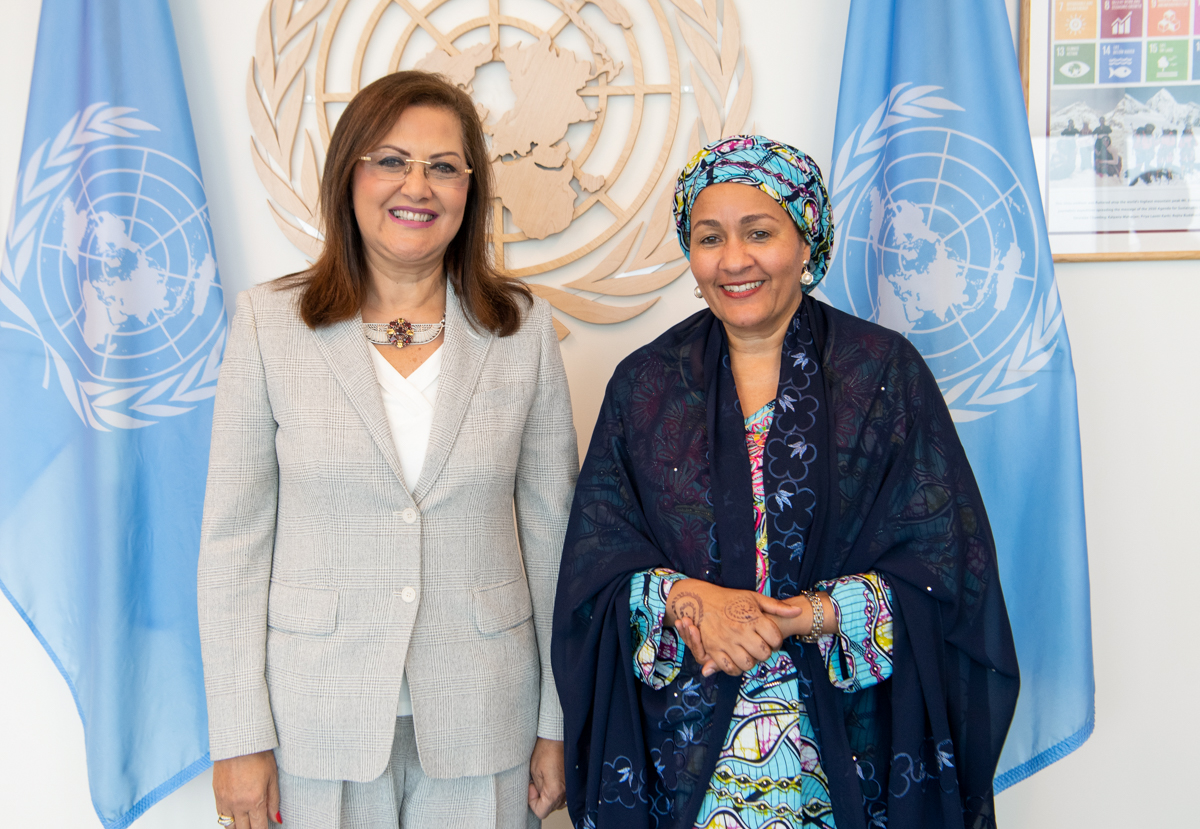Deputy Secretary General Amina J. Mohammed meets with H.E. Dr. Hala Elsayed, Minister of Planning, Monitoring and Administrative Reforms of EGYPT. Dr. Elsayed is an inspiration to Arab women interested in politics. Photo: UN Photo/Eskinder Debebe
From suffragettes to modern day feminists, women and men have fought long and hard for women’s right to vote and hold office.
Progress is clear. As of 2015, women in every country in the world have the right to vote; the first nation to grant female suffrage was New Zealand in 1893, and the last country was Saudi Arabia in 2015. Today, several countries are led by females and some countries, such as Finland, also have a cabinet dominated by women. These achievements have been possible in large part thanks to gender equality measures. In the Arab region where progress has been slowest, the adoption of quotas by 12 countries helped increase the percentage of women in parliaments from 10 to 18 percent between 2012 to 2017.
But progress is slow and uneven. Women are still underrepresented in politics, parliaments and public life. Women make up less than 23 percent of parliamentarians, with an average of 18 percent in the Arab region, while men make up more than 77 percent, leaving a more than 50 percent gender gap. Attitudes towards women candidates are still largely characterized by deeply ingrained stereotypes, and political opponents will often use those stereotypes to question women’s capabilities.
Why is this still an issue in 2020?
When we talk about women’s political participation, it is easy for us to imagine the empty seats around the decision-making table, and a little more difficult to picture the many obstacles and challenges women face to get into those seats. There is a growing recognition that women in 2020 are marginalized from political and public life. In the past few years, we’ve seen this play out in high profile elections in the US and around the world. Women are putting themselves forward for elections more and more, yet their numbers are still far behind those of men. Why is this the case? Even though it is widely accepted that development, peace and prosperity in societies cannot be achieved without half of the world’s population, women continue to be sidelined in decision-making. The stigma against women in politics is still alive and well. They continue to face structural, socioeconomic, institutional and cultural barriers.
Tackling those barriers takes effort on the part of every element of society whether it is government, civil society, the media, academia, the private sector, youth and yes, even men.
Women in office motivate other women
The fact that more women are willing to run for office is a positive step. A study by High-Pipper and Comer showed that women represented by a woman are more interested and become more involved in politics and feel more skilled and effective than did those represented by a man. At a recent gathering of Arab youth, part of UNDP’s flagship Youth Leadership Programme, young women spoke of the lack of female public figures in the Arab region that they can look up to, and be inspired by; “we would like to see our own AOC in the Arab region, someone we can point to as a positive image of women in politics”. When women represent other women, they are representing half of society, and can we really consider elections that do not include half of society democratic? Or institutions without gender parity, strong?
The UN’s commitment
UNDP is working on promoting women’s political participation at different levels and in different ways:
- The internet plays an important role not only in awareness but also in helping women candidates run for office, evening the playing field and promoting their causes by reaching a wider audience. Despite its negative effects on women candidates, and there are many, social media offers great opportunities; it reduces the cost of campaigns, and offers different means of communication. UNDP is harnessing social media to raise awareness, promote networking and create a more positive narrative.
- Youth are a very important part of promoting women in public and political life. They lead social change around the world. UNDP recognizes and has engaged young people in the fight for gender equality, and women in politics.
- In the Arab region, UNDP is shifting the narrative of women’s participation by connecting institutions and civil society. It is proud to have supported the Organization of Arab Election Management Bodies, to launch the Arab Network for Women in Elections. It’s creating civic space with the aim of amplifying the voices of women in politics, highlighting the successes that Arab women have had and shedding light on the challenges they still face. It is a platform for institutions that manage and administer elections, civil society organizations that advocate for and promote women’s political participation, and international organizations that support these efforts including UN Women, the International Institute for Democracy and Electoral Assistance and the International Foundation for Electoral Systems.
Do not hesitate to get in touch and to learn more about what the network and its members are doing, and how you can be a part of this pivotal moment in pushing forward what women before us have started.

 Locations
Locations
